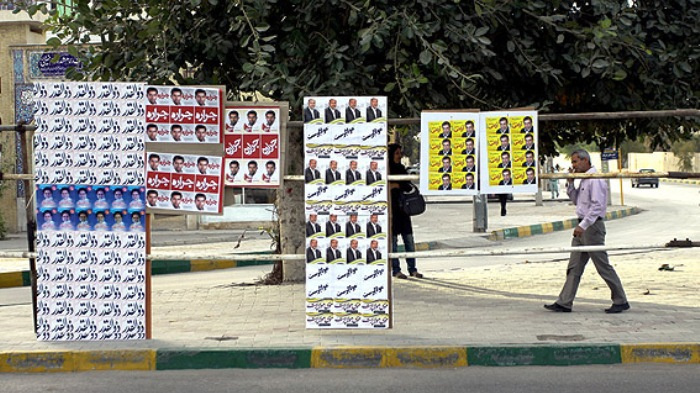Sons, Brothers, Cousins: Strategies of vote-collection in small towns

While the mainstream media, both domestic and international, have largely focused on the Reformist vs. Conservative competition in Iran’s parliamentary elections, a reductionist framing of Iranian politics which is becoming less and less functional in the post-2009 developments, the social media users in Iran have found a new source of delight in the electoral campaign ads published by the candidates, mainly in smaller cities.
The pattern of politicking and voting in many smaller cities significantly differs from those in the larger towns, with votes mostly divided over familial, ethnic and tribal lines and complex networks of patronage. Slogans and goals are largely different from the center, focusing on needs of the locals of the community. In this context, candidates purporting to have influence to negotiate with the government and bring jobs and facilities to their hometown usually hold the upper hand. Flyers and posters published in smaller cities may also differ from the more professional ones displayed and distributed in larger cities, at times turning into the butt of the joke when they leak into the online sphere. Iranian Diplomacy has cast a look at some of these posters:
Familial relations and association with well-known local or national figures are apparently regarded as powerful tools for gaining votes as one can understand from some of the posters published online these days. We cast a look:
This large poster introduces the candidate as “son-in-law of the late Davoud Ja’fari Ghazani, mountaineer and famous hero of Azerbaijan”.
.jpg)
This candidate introduces himself as “son of Haj Mohammad-Hassan Soroush, authorized assistant of non-registered dentist in Mahallat”, a small town in central Iran.

Some candidates occasionally view their posters as their curriculum vitae and fill it with their presumed achievements, however minor or irrelevant they may be. This candidate from the city of Sabzevar in Khorasan region has capabilities that range from design of an unfamiliar “global system of economy with the capacity to create 3 million jobs” (“the biggest project in Iran’s history”) to “authoring the books: Status of Parents according to Islam, The End of Sunset and the Mirror of Love” to teaching in a branch of the Islamic Azad University in Tehran. The same candidate also reminds the voters that his cousin and brother have been in charge of construction of a mosque in the city.

The most circulated ad of this type is this theatrical tête-à-tête between father and son, one a former member of the parliament and one an aspiring candidate. Wagging his finger at his son in a gesture of warning, the father is asking him to be careful not to disgrace him after fifty years of serving the people, according to the pictures caption.

The most awkward poster however belongs to this candidate who seems to have chosen defamiliarization as his advertisement strategy, and brags about his detachment from such familial and power affiliations. Mohammad-Reza Taheri Kateh Sari, who seems to be running for a seat in one of the cities on the coast of the Caspian Sea, has called himself ‘kuchulu’, “the tiny one” to stress his uniqueness. “I’m tiny” his flyer reads. “I, Mohammad-Reza Taheri Kateh Sari have remained tiny because I am connected to no center of power or wealth anywhere.”

Botched ads also abound, like a cleric’s poster that contains promises to facilitate production, employment and marriage but fails to mention the name of the candidate,
.jpg)
or the one for this incumbent MP who seeks reelection, whose poster is adorned with an upside-down version of Iran’s three-color flag (below).

Some candidates have tried to add a dose of innovation to their campaign ads, like this Principlist female candidate running from Alborz Province that seems to have plagiarized democrat US presidential candidate Hillary Clinton’s idea and produced and uploaded this video to her channel on Aparat.com (a YouTube style Iranian popular video-sharing website) that features her as she listens to the expectations of “the children of her land, away from the political ado”.
Promises of gifts or grants are also nothing new for voters in Iran. Photos of a parliamentary campaign encouraging people to enroll at the headquarters to receive one-year free internet services are circulating online, besides news of a woman running for the parliament from Lorestan province who has reportedly promised her supporters to hand them pink lipstick (if women) or pink-frame glasses (if men). The independent candidate has justified the move on the basis that her campaign headquarters’ color is pink and everyone bearing something in the color is asserting his or her support for her.
Amateurish campaign ads of smaller cities, with all the enthusiasm and optimism that they exude, stand in contrast to the current mood of campaigns in Tehran, especially the one prevailing among the Reformists. A poster urges voters’ turnout while remembering a demand to end the five-year long house arrest imposed on leaders of the Green Movement, Mir Hossein Mousavi and Mahdi Karroubi, after a controversial election in 2009 provoked street protests, while another one features a bandaged index finger with indelible ink on it, captioned “our wounds not healed, our pains not diminished, but …”.

(This piece was modified and further information was added.)

